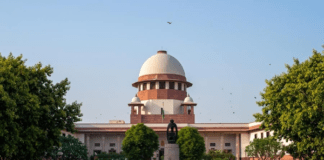The Supreme Court rules foreign firms with temporary premises in India are liable for tax, rejecting Hyatt International’s plea. PE concept clarified.
Foreign entities using even shared or temporary premises in India may now face taxation after a landmark ruling by the apex court.
In a pivotal decision with far-reaching implications for multinational corporations, the Supreme Court of India has held that the existence of a Permanent Establishment (PE) does not require exclusive or long-term possession of a business location in India. The verdict, delivered on July 24, firmly establishes that temporary or shared premises can qualify as a PE if the foreign entity exercises administrative or operational control over them.
The ruling came in the case of Hyatt International, which had appealed against a Delhi High Court decision that upheld its tax liability under Indian law. The apex court’s dismissal of the appeal not only affirmed the High Court’s stance but also clarified the scope of what constitutes a PE under the Income Tax Act and international tax treaties.
What Is a Permanent Establishment (PE)?
A Permanent Establishment refers to a fixed place of business through which the operations of a foreign enterprise are wholly or partly carried out in another country. As per Article 5 of the Double Taxation Avoidance Agreements (DTAAs) signed by India, PEs can trigger taxation rights for the host country.
Traditionally, this term has been understood to mean a long-term, exclusive business location, but Thursday’s ruling significantly broadens the interpretation.
Court’s Reasoning: Control Over Premises Is Key
The Supreme Court bench, led by Justice B.V. Nagarathna, ruled that Hyatt’s administrative control over a liaison office in India, even though it was not in its exclusive possession, was enough to constitute a PE. The Court emphasized that the duration or nature of the occupancy—whether shared, rented, or temporary—is not determinative. What matters is the degree of control and continuity of business activities.
“The question is not whether the premises are exclusive or permanent in the classic sense, but whether the foreign entity has sufficient presence and control to carry out business,” the Court stated.
This landmark interpretation aligns with global tax jurisprudence, especially decisions from countries like Germany and Canada, which have increasingly favoured substance-over-form analysis in international taxation.
Implications for Foreign Corporations
This judgment could have sweeping tax consequences for foreign businesses operating in India, especially those who believed they were exempt due to the non-exclusive or short-term nature of their operations.
Legal experts note that the ruling:
- Closes a major loophole for companies attempting to avoid Indian tax by using temporary setups.
- Encourages tax authorities to scrutinize liaison offices, representative setups, and project offices of foreign firms more closely.
- Puts the onus on companies to re-evaluate DTAA benefits, especially under Article 5 (PE clause).
This is especially relevant in sectors like hospitality, tech services, and consulting, where foreign entities often maintain limited-time local presence through event-specific or franchise-support operations.
Hyatt International’s Argument Rejected
Hyatt International contended that it did not carry out any core revenue-generating functions from its India office and that the premises were used temporarily for support activities. However, the Court rejected this argument, stating that:
- Support functions can still contribute to the business’s core revenue stream.
- The test of permanence is functional, not necessarily physical or temporal.
Hyatt’s plea that its India operations were solely “preparatory or auxiliary” in nature, and hence not taxable under the DTAA, also failed.
Alignment with Global Tax Principles
This decision underscores India’s commitment to the OECD’s Base Erosion and Profit Shifting (BEPS) framework, which aims to curb tax avoidance by multinational enterprises. By affirming that the economic substance of operations trumps their legal form, the Court reinforces a principles-based approach to taxation.
Conclusion: A Call for Caution
For multinational businesses operating in India, this ruling is a wake-up call. Temporary presence, once seen as a safe harbour from Indian taxation, is no longer immune. Tax departments, legal advisors, and CFOs will now need to reassess their Indian operations to ensure compliance and avoid litigation.
Internal reviews of operational control, staffing, and the scope of in-country activities are now essential.
Related Reading on The Legal Observer
Explore more on India’s evolving tax laws in our National News section. For deep dives into similar rulings, visit Views → Insight or our legal Wall of Fame.
🎥 For expert discussions on this and related cases, check out our YouTube channel here.
Focus Keywords
Supreme Court, Permanent Establishment, India tax law, Hyatt International, foreign entity taxation, DTAA, temporary premises
Internal Links Embedded:
- https://thelegalobserver.com/category/news/national/
- https://thelegalobserver.com/category/views/insight/
- https://thelegalobserver.com/wall-of-fame/
External Link Embedded:




